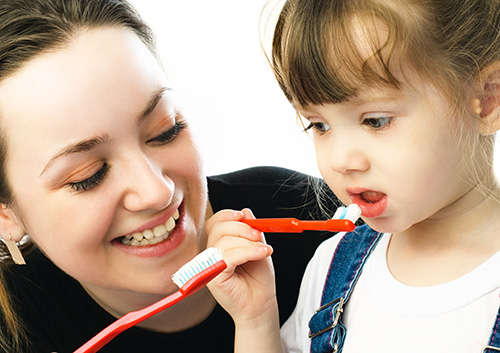May 14th, 2019

With advancements in prosthetic dentistry, patients are now able to wear dentures that are comfortable, natural looking, and long lasting. There are different options to choose from that will meet your individual needs, whether you have a few teeth missing or have lost all of your teeth. Dr. Ghenta will be able to help you decide which denture option is best for you.
Partial Dentures
Patients who receive partial dentures have some of their original teeth still in place and therefore only need a partial to replace the missing teeth and keep their existing teeth from moving. It also makes sense that patients need them to be able to eat comfortably. All dentures are made from porcelain or plastic and are made with comfort in mind.
Complete Dentures
If you have suffered from complete tooth loss, you would typically receive complete dentures. Immediately after you have your teeth extracted you will leave the dentist office with a set of temporary dentures. These will be worn for a few months while your mouth heals. After this initial wait time, your conventional or permanent dentures will be ready to be fitted.
Implant-Supported Dentures
Implant-supported dentures involve a more invasive procedure, but are also permanent. A select number of implants are placed into the jaw. The denture is then attached to the implant posts. You will be able to chew normally and maintain normal dental hygiene, like brushing and flossing.
Dr. Ghenta will be able to advise on which kind of denture would be the best based on your individual needs. Contact our Dartmouth, MA office to schedule an appointment!
May 7th, 2019

Bad breath: We’ve all dealt with it. You’ve been around people who have it and, like it or not, you have had it yourself. It can be embarrassing and uncomfortable, but how do you know if you have it? There is actually a simple test you can do to see if you have bad breath.
Wash your hands well, then put your finger in your mouth, way in the back. Scrape a little saliva from the back of your tongue, and then dab it on the back of your hand. Wait for one minute, then hold your hand to your nose and sniff. Is it fresh as a daisy? Or do you need to keep reading and learn how to freshen your breath?
How Bad Breath Starts
There are several ways that bad breath starts. Knowing the causes of bad breath is a solid start toward the cure.
- The bacteria in your mouth: Bacteria is always in your mouth. It covers your gums, hides between your teeth, and hangs out on your tongue. As it multiplies, it produces toxins that cause the foul odor in your mouth.
- Your bad habits: If you smoke cigarettes, a pipe, or cigars, or chew tobacco, you are not only harming your mouth and body, you are creating some really smelly breath.
- Your tonsils: If you still have your tonsils, they can be the cause of bad breath. They are pitted, so smelly substances can collect in the pits and lead to bad breath.
- Stomach issues: A stomach virus, ulcer, GERD, and other stomach issues could be the cause of your bad breath. A low-carb diet can put your body into a state of ketosis, which causes very bad breath.
- The foods you eat: Garlic, onion, and other pungent foods will linger with you … on your breath.
Tips for Busting Bad Breath
Achieving fresh breath isn’t difficult, but it does require a little work. Try these tips for fresher breath and a healthier mouth.
- Brush your teeth after every meal. You can also pick up a tongue scraper to use a couple of times a day to remove any lingering bacteria on your tongue.
- Floss once a day to remove food particles between your teeth as well as plaque. Your mouth will thank you.
- Gargle with special mouthwash to banish bad breath. The oxygen in it will kill the bacteria in your mouth that is causing your bad breath, and leave you fresh as a daisy!
- Drink water to avoid dry mouth, which is a common cause of bad breath.
- Ease your tummy troubles with antacids and other remedies. Ginger tea is a great tummy tamer.
- Chew gum that contains xylitol. Saliva keeps your mouth moist, and chewing gum makes you salivate. Bye bye, bad breath!
- Eat yogurt. It contains “good” bacteria that helps balance your gut and gives you a healthier mouth.
- Soothe your sinuses. Sinus infections can cause you to have bad breath. Actually, it is the post-nasal drip that causes the foul odor. Cure the infection and your breath will improve.
- Avoid all tobacco products (cigarettes, pipes, cigars, chewing tobacco, and snuff).
- Eat a healthy diet of fresh fruits and vegetables, lean meats, and whole grains.
And don't forget! Get regular dental checkups at Ghenta Dental Group.
April 30th, 2019

When it comes to dental hygiene, “going green” is not the first phrase that comes to mind. But if you are brushing properly, you are also replacing your toothbrush every three to four months as the bristles become frayed and wear down. Sure, that’s a tiny amount of plastic from each of us going to our landfills, yet it adds up to millions of brushes a year nationally. If you are concerned about reducing your carbon footprint while reducing your risk of cavities, there are several new toothbrushes designed to make brushing more eco-friendly.
Biodegradable Toothbrushes
Some brushes claim to be completely compostable. These models generally have heads fitted with boar bristles and handles manufactured from sustainable woods or bamboo. Boar bristles aren’t for everyone. Some users complain of the taste of the bristles, and boar bristles might be harsher than the soft bristles we recommend to protect both enamel and gums. There is also some concern about bacteria growth on organic bristles.
Earth-friendly Handles and Bristles
If you prefer the consistency and texture of regular synthetic bristles, you can still opt for a brush with a handle of sustainable wood or bamboo. You can also select PBA-free bristles, bristles made primarily of castor oil, or bristles that use natural ingredients in combination with synthetics.
Reduce, Reuse, Recycle
If these exotic brushes aren’t for you, there are more conventional choices that will save energy and cut down on waste.
- Reduce the amount of electricity you use for your electric toothbrush with a model that requires less charging time.
- Reuse your toothbrush by buying one with a handle made of metal, natural materials or plastic and replace the detachable head every three months.
- Recycled plastics can be found in the handles of some toothbrushes, and many brushes come in recyclable packaging. Every bit helps!
If you decide to use one of these green products, remember that your dental health is still the primary goal. Be sure the bristles of your brush are soft enough to protect your gums and enamel and can reach all the places you need to brush. The handle should be easy to grip and the head should be a comfortable fit for your mouth. It’s always best to choose products with a seal of acceptance from your local dental association, or talk to us about greener alternatives during your next visit to our Dartmouth, MA office. Luckily, there are several workable options to protect the health of your family's teeth while still being mindful of the health of our planet.
April 16th, 2019

Oral-systemic health is the idea that oral health is a critical and interconnected component to a patient’s overall health and well-being. Studies show that people who have poor oral health are more likely to have other health conditions such as heart disease, diabetes, or a high likelihood of stroke.
Some of the data suggests that oral pathogens may trigger up to 50% of heart attacks, and that the oral bacteria P. gingivalis may cause a 13.6-fold increase in patients’ risk of a heart attack.
Still, the exact relationship between oral and overall health isn't fully known — whether one causes the other or how treating one might affect the other. But it should serve as a warning call to anyone suffering with poor oral health, especially periodontal disease.
More studies need to be conducted to establish the precise link between the two, but whatever it is, one thing is certain: good oral hygiene makes for good oral health. Many dentists and doctors realize the need to work together as a cohesive healthcare team to improve and maintain the health of their communities.
The American Dental Association says oral health is essential to overall health, and not just a luxury. They are setting goals to reduce the amount of tooth decay in low-income communities for both children and adults.
So what is a patient about this information regarding oral-systemic health? Here are some tips to increase and maintain your overall well-being:
- Have an effective oral hygiene routine. Brush twice a day for two minutes each time, floss daily, clean your tongue, and avoid sugary beverages.
- Visit your dentist regularly. Regular cleanings and checkups at your dentist’s office will keep your mouth clean and ensure you’re taking good care of it.
- Eat a healthful diet. A diet rich in fruits, vegetables, whole grains, and natural, unprocessed foods contributes to the overall health of your body.
- Stay hydrated. Drink plenty of pure, clean water throughout the day. A good rule of thumb is to drink eight eight-ounce glasses a day.
- Relax, destress. Stress can play a big role in all forms of disease. Take time during your day to relax, meditate, stretch, and allow your body and mind to rest.
If you have questions about your oral health and how it may be affecting your general health, feel free to ask Dr. Ghenta during your next visit to our Dartmouth, MA office.
15.00






 Website Powered by Sesame 24-7™
Website Powered by Sesame 24-7™